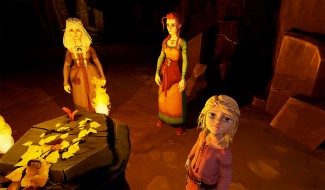I try not to let my emotions get the better of me, but in Fated: The Silent Oath, a first-person action-adventure game recently released for Oculus Rift and HTC Vive, there’s really nothing I could do to ward off the strange feeling that I, the least dad-like person on the planet, had to protect a human child. And you know what? I kind of liked it.
With a mead horn strapped to my side and impossibly broad shoulders, I wake up in the back of a horse-drawn cart, apparently fleeing from a destroyed settlement. Stepping into the shoes of a simple Viking villager, the silent protagonist Ulfer, I learn that I’ve lost my memory—and more importantly, my voice. Nodding my head ‘yes’ and ‘no’ is my only way to communicate, but my wife is glad that I’m alive just the same. Her father, not so much—and if that’s not realism, I don’t know what it.
The whole experience is set to the backdrop of the various gods and monsters of Norse mythology, and if you don’t know anything more than what you picked up from the Thor movie franchise (Do you even read the Poetic Edda, bro?), Fated is more than happy to teach you from the perspective of a child. Your daughter, Lif, asks questions about whether you believe in the Jötunn, the mythical ice giants, and the holy woman Edda tells you how the Jötunn came to be as your family runs for their life from the towering demi-god.
Fated delivers a sort of Pixar-esque cartoon style that hovers safely on the near side of the uncanny valley, which means you’ll be able to make the sort of emotional connection with the characters without over scrutinizing them visually. This is tinged however by brief moments of not-so-great voice acting—which at times felt unnatural. Voice-heavy VR experiences like Fated are kind of a risky proposition that way, as a single insincere line can be more of an immersion-breaker than a dropped frame.
That said, I immediately bonded with my little daughter Liv for a few reasons. To me, kids are annoying little drunk people, and I’m the sort of person that would pay extra for an adults-only flight so I don’t have to deal with them. But when you’re put in the driver’s seat of a horse-drawn cart and you have to dodge the angry fist of an 800-foot tall ice giant, and a child is pleading “Daddy, help me!”… you’re going to feel something inside. I dare you not to.
These moments especially pull on your heartstrings—you can call it ‘latent paternal instinct’ if you want—but it’s the times when you’re hanging out, or walking somewhere when you really get a sense of what sort of person Liv really is. Like most kids, Liv does whatever the hell she wants, and there isn’t a spare moment when she isn’t bopping around and saying all sorts of silly things, whether it be a line of questions or the constant quipping between her and older cousin Sven. I got a real sense from Liv’s dialogue and direction that she’s got to be based on a real kid, an adorably cute one at that.
Warning: the video below contains spoilers.
While I’m not a dad (maybe I will be someday, I don’t know), for a brief 2+ hours I felt something I’ve never felt before: the burning need to protect my family in the face of dire circumstances. That feeling stayed with me well after I finished the game—only the first part of a multi-part series. In fact I was so surprised by the end of the last chapter, I replayed it twice to be sure what I saw was real. And that’s the sort of real drama that I want to experience in VR.
There are a few puzzles scattered throughout the narrative, most of which focus on matching symbols, but I felt like these were just too simple to be truly engaging. Then again, movies and games have taught us that entering a centuries-old temple only requires minimal effort on the part of the protagonist, so this is par for the course I suppose.
Comfort
As with all first-person experiences, comfort is an issue. But with a good number of navigational options at your disposal you can almost always assure yourself a comfortable time. Fated not only includes a ‘snap turn’ rotational mode (aka ‘VR comfort mode’) with variable angles, and a ‘yaw stick pan’ for traditionalist, but also several styles of graphical overlays that give you anchor points in the world, like floating squares and other translucent particle effects. Particle effects have proven time and time again to help reduce the dreaded ‘sim sickness’, and it’s good to see a game lets you toggle these to suit your gameplay style.
To me, being comfortable also means being unencumbered, and the fact that there isn’t a fast-walk option—only the same slow plodding pace throughout the whole game—makes me feel slightly uncomfortable. Maybe not physically, but there is a certain amount of frustration in not being able to walk how 99 percent of the first-person games allow you to (and with no explanation as to why).
Overall, I really enjoyed Fated and can’t wait to see what happens next in the series, and maybe learn a little more about Norse mythology in the process. You can buy it on Steam or Oculus Home.











